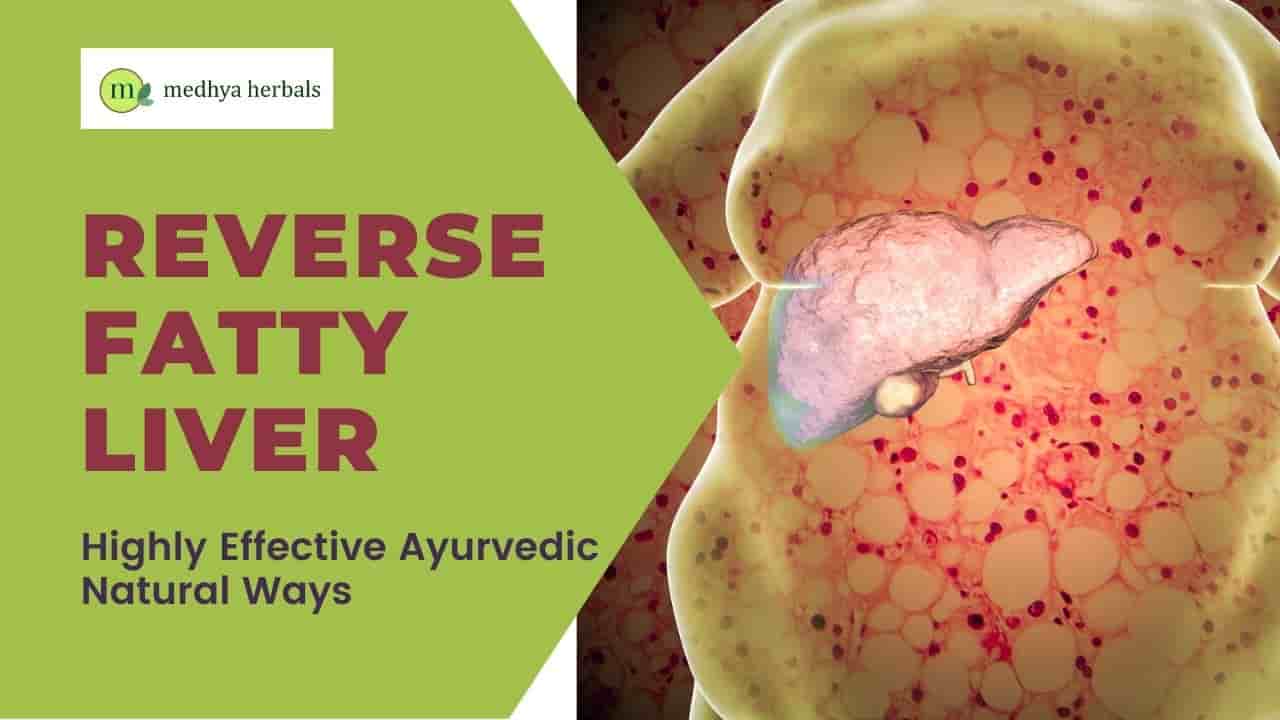Fatty liver is a condition in which there is an abnormal accumulation of fats, specifically the triglycerides inside the liver cells. Fatty liver disease is a reversible liver disorder in which diet and lifestyle play an important role.
A fatty liver is often also associated with metabolic health conditions such as Diabetes, PCOS, Obesity, Metabolic Syndrome and High cholesterol levels. More often than not, fatty liver disease doesn’t show any specific symptoms, but is diagnosed by tests once peripheral conditions start to appear.
In this post we will look into fatty liver disease symptoms and causes. We will also cover whether it is possible to completely reverse fatty liver, in which cases it can be done and the best natural ways to get your liver back to normal.
What is Fatty Liver?
A healthy liver stores some fat to carry out metabolic functions that take place inside it. However, when the amount of liver fat increases to 5%-10% of the liver’s weight or more than 30% of liver cells are loaded with fat; it is termed as a fatty liver.
Excess fats inside the liver causes inflammation, deformation and damage to the liver cells.
Non-alcoholic fatty liver disease is the most common liver disorders across the world that affects primarily adults in the age group of 40-60 years. It is estimated that 10-40% of the general population may have fatty liver. And of these, around 15% have severe liver condition that can develop into liver cirrhosis and cancer.
Fatty Liver Disease can happen in two ways:
1. Alcoholic Fatty Liver Disease
Alcoholism with nearly 2-3 drinks per day for women and 3-4 for men or more than 20g/day can also lead to Fatty Liver. However, this condition develops after years of alcohol abuse.
2. Non-alcoholic Fatty Liver Disease
In this condition, the liver cannot function to metabolize the fats, carbohydrates, and proteins. Obese persons and mainly women have more chances to get affected by this disease.
Nonalcoholic fatty liver disease usually happens along with obesity and insulin resistance. However, it may well be present in lean people.
The 4 Stages of Non-alcoholic Fatty Liver Disease NAFLD
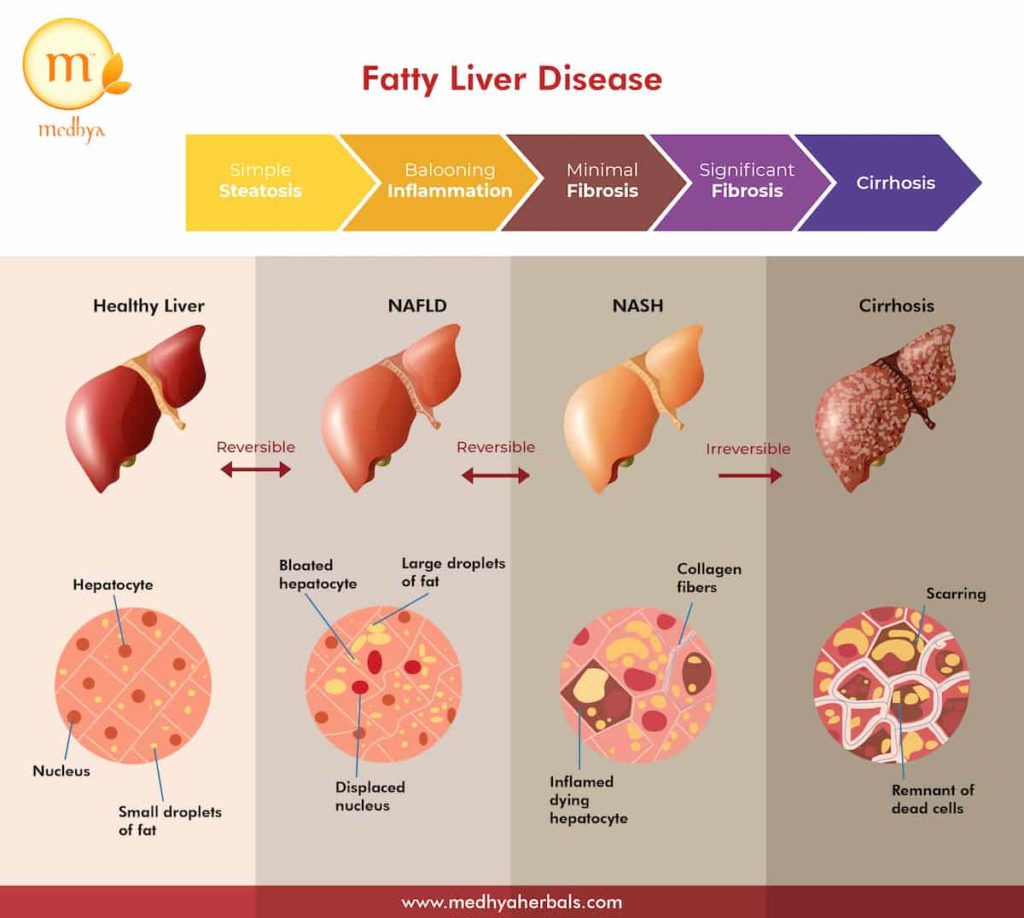
Fatty liver disease is progressive disease. Meaning, if you do not treat your liver in time, a fatty liver may lead to permanent damage and scarring to liver cells. It is termed as liver cirrhosis, the last stage of fatty liver disease and the point beyond which you won’t be able to reverse fatty liver.
Here’s how non-alcoholic fatty liver disease progresses and affects liver function.
Stage 1 – Fatty Liver
In the first stage, liver function is compromised due to excessive fat, more than 5% of liver weight. This leads to bloating of liver cells and enlargement of liver. The initial stages of fatty liver disease are usually reversible by changes in diet and lifestyle.
Stage 2 – NASH and Inflammation
However, if liver health is not managed at right time, then fatty liver may progress to non-alcoholic steatohepatitis (NASH). In this stage, excess fat in the liver cells severely affects its normal functioning. They are deformed and displaced causing severe inflammation, leading to pain in the upper right of abdomen.
Stage 3 – Fibrosis
At this stage, permanent damage happens to the liver cells and they stop functioning. The damaged liver cells may be present in one particular area of the liver or may be spread out. The extent of damage and scarred tissues is categorized into stages 0 – 4.
Stage 4 – Cirrhosis
In this stage the scarred tissues permanently replace the normal tissues of the liver. As a result of which, they block the flow of blood and other nutrients to the liver.
Health complications of liver cirrhosis include uncontrolled bleeding, kidney failure, heart diseases, liver cancer, diabetes and eventually, liver failure. That’s why it is so important to take action in time. And not take fatty liver disease lightly.
Fatty Liver Disease Symptoms
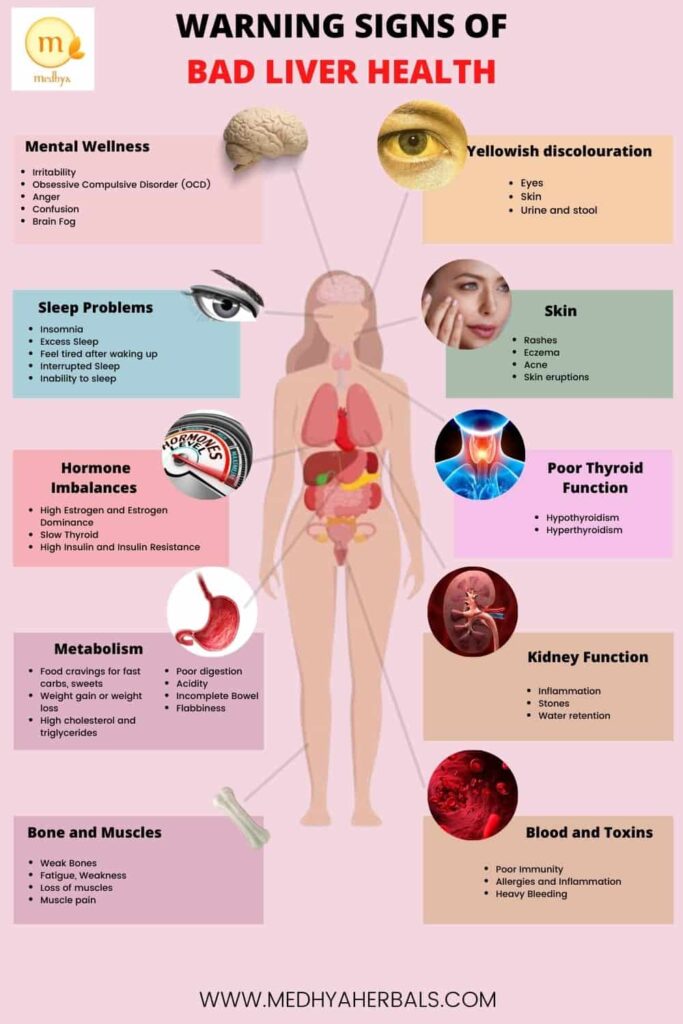
An under performing liver leads to many health symptoms related to poor digestion, nausea, skin rashes and hormone imbalances. However, these signs are fairly generic and may not always indicate fatty liver.
Therefore, when people get affected by this condition, they don’t recognize what they have. But some people feel pain in the middle or right side of their stomach and feel very tired.
- Nausea
- Low or no appetite
- Unexplained weight loss
- Nutritional Deficiencies
- Muscular pain
- Enlarged Liver
- Constant Fatigue
- Pain in upper right abdominal area
Symptoms of NASH and Liver Fibrosis (advanced scarring)
Here are the most common Liver Fibrosis and NASH Symptoms:
- Abdominal swelling (ascites)
- Enlarged breasts in men
- Yellowing of the skin and eyes (jaundice)
- Enlarged blood vessels just beneath the skin’s surface
- Enlarged spleen
- Red palms
Symptoms of Liver Cirrhosis and Liver Failure
If fatty liver advances to cirrhosis and liver failure, following symptoms can be observed:
- jaundice of the skin and eyes
- an increasingly, fluid-filled abdomen
- confusion
- abnormal bleeding
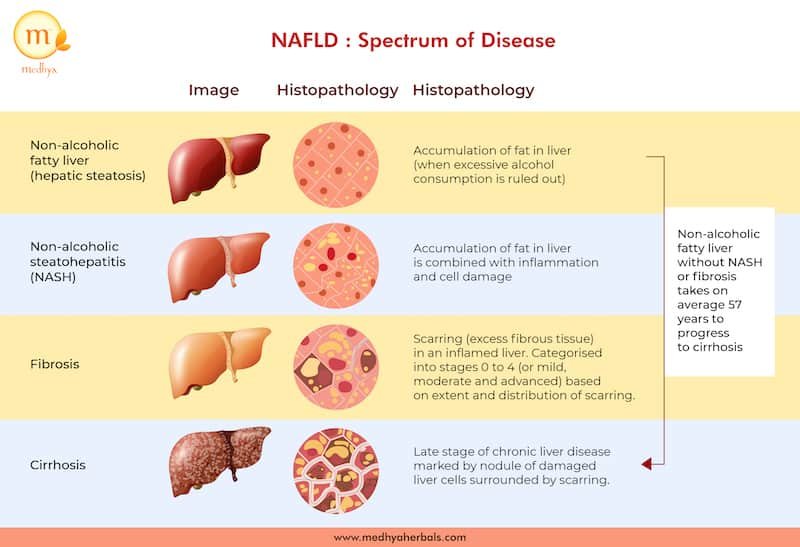
Primary Causes of Fatty Liver Disease
When liver is constantly loaded with alcohol or high-calorie foods, then it may end up storing fats that are more than required. A constant dump of fats on the liver stresses it out and reduces its functioning. This leads to development of fatty liver disease.
The prevalence of liver-related disorders such as fatty liver has increased incidentally in the past couple of decades due to sedentary lifestyles combined with energy-rich diets and high use of chemical-based household products.
Sometimes, genetic causes give rise to liver diseases. And with that, if you carry on with drinking, you will have alcoholic hepatitis, liver failure, cirrhosis, and severe odds of liver cancer.
Usually, obesity, diabetes, high blood pressure, high cholesterol, high triglycerides, hepatitis C, liver infections, and medications such as drugs for cancer or heart problems are the triggers for nonalcoholic fatty liver disease.
Factors and Triggers for Fatty Liver Disease
Additionally, here are the causative factors involving diet and lifestyle that make you prone to develop fatty liver in the first place:
- Too much intake of processed foods or foods that are rich in simple carbohydrates such as sugar and white flour
- Too much intake of refined fats and processed fats such as margarine, processed cheese, deeply fried foods
- A sedentary lifestyle with low or no physical activity
- Insulin Resistance and or Diabetes
- Alcohol abuse in alcoholic fatty liver
- Sometimes, side effects of certain medications can cause fatty liver disease, for example, tamoxifen (Nolvadex), methotrexate (Trexall), amiodarone (Pacerone), and valproic acid (Depakote), etc.
- Prolonged exposure to environmental toxins
- Rapid weight loss, for example losing 7-10 Kg or more in 1 month
- Family history of fatty liver
- Sudden Fatty liver during pregnancy (rare but present in cases where liver function was compromised before conception or during pregnancy)
Health Tips to Reverse Fatty Liver Disease Naturally
Liver inflammation (steato-hepatitis) can give rise to health complications such as liver scarring, liver cancer, and end-stage liver disease.
Though there have been efforts to discover medications and cures for fatty liver, modern medicine yet has little to offer in this regard.
Additionally, research points out to strong evidence for prevention and reversal of fatty liver by lifestyle adaptations. Here are some suggestions for you to start:
1. Fatty Liver Diet
Eating a healthy diet is one of the most important things you can do to reverse fatty liver disease. There are a number of nutrients that are important to support healthy liver function and help you to get rid of the accumulated fats in the liver. These nutrients include protein, fiber, vitamins, minerals and healthy fats. Eating foods that are high in these nutrients can help to improve your liver health and reverse fatty liver disease.
In addition, a fatty liver diet plan with plenty of fresh fruits and vegetables, whole grains, lean protein, and healthy fats can help your liver function properly and prevent the accumulation of fat. Here are diet tips for fatty liver disease:
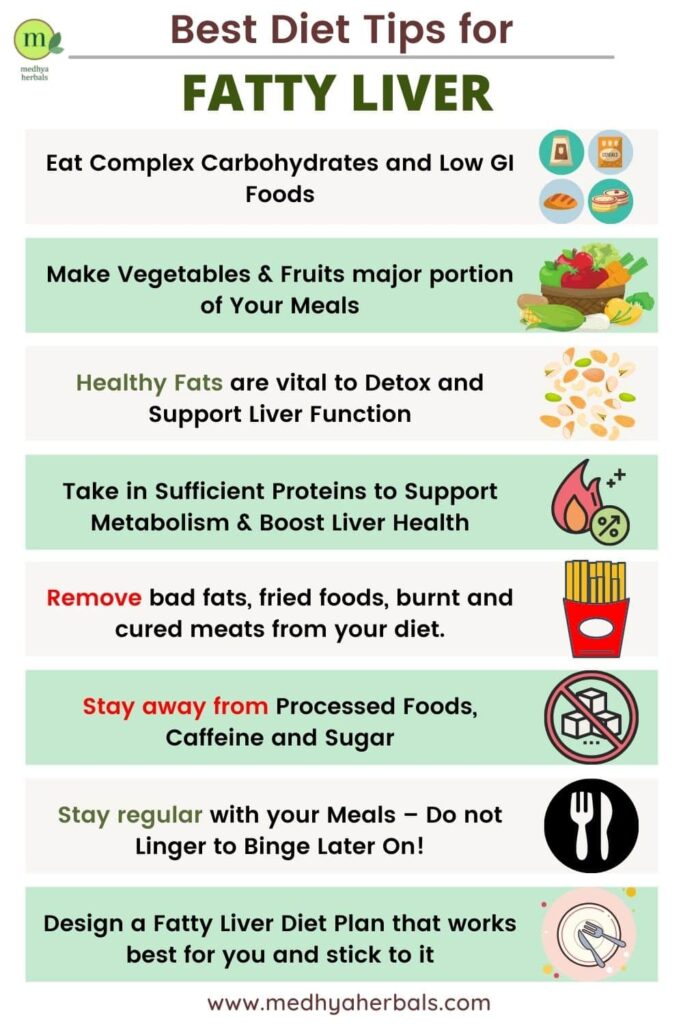
- Increase your water intake and make sure to get at least 8 cups of water a day.
- Stay hydrated with natural drinks such as water and coconut water. Stay away from processed juices and sugary beverages.
- Include liver healthy foods such as green leafy vegetables, celery, broccoli, beets, beans, grains and lentils.
- Take in healthy fats from seeds, nuts, ghee and fatty fish. Limit the amount of fats in your diet and strictly avoid bad fats from processed foods, fried snacks and refined oils.
- Avoid alcohol, caffeine, and tobacco as they can damage the liver.
- Increase intake of herbs and spices that can boost liver function and help you to detox the liver.
- Avoid processed foods, sugary drinks, and excessive amounts of saturated and unhealthy fats.
- Always consume freshly prepared meals made from wholesome foods. This will provide you with sufficient antioxidants to fight liver inflammation and support digestive fire.
2. Healthy Lifestyle to Naturally Reverse Fatty Liver
If you have fatty liver, it is important to make lifestyle changes in order to improve your condition. Liver healthy lifestyle will also help you in keeping other problems like obesity, diabetes, and heart disease under control.
- Hydration: It is vital to drink plenty of water and other fluids if you have fatty liver. This will help your body flush out toxins and reduce fat buildup.
- Diet: Eating a healthy diet is essential for people with fatty liver. Avoid processed foods, sugary drinks, and refined carbohydrates. Instead, focus on eating plenty of fruits, vegetables, lean protein, and healthy fats.
- Exercise: Exercise is a important for people with fatty liver. It can help you lose weight, reduce fat storage, and increase insulin sensitivity.
- Sleep: Getting enough sleep is important for people with fatty liver. Fatigue can worsen fatty liver symptoms. Always make sure to get 6-8 hours of sleep in the night. Avoid day time sleeping and do not go to bed right after your meals.
- Stress: Managing stress is important for people with fatty liver. Stress can worsen fatty liver symptoms and promote fat storage. Try to find healthy ways to manage your stress levels. Yoga, meditation, and deep breathing exercises can all be helpful.
- Weight loss helps to reverse fatty liver. Studies (references below) indicate that weight loss of up to 7% can relieve the symptoms of NASH and give your liver a chance to get rid of the excess fat storage.
3. Exercise to Detox and Reduce Fatty Liver
Regular physical activity and exercise helps to improve fat metabolism and flush toxins from the liver. Exercise is an important part of maintaining healthy liver.
It helps to use up calories stored in body as fat. In addition, it also relieves tension and tones up the muscles of the body.
When you follow a consistent exercise regime, it will help you to reduce fatty liver symptoms. And slowly you will be able to get rid of fatty liver condition.
Walking and Yoga are the best exercises to begin with. However, stay regular with your chosen fitness regime and add complex workouts as and when required.
Here are some ways in which you should stay active:
- Walking briskly for 30 mins a day is an achievable target that you can begin with.
- Try as much as possible to not live a sedentary lifestyle. Always take up a chance to move and not sit.
- Use steps instead of elevators, involve in sports rather than computer/video games and do more physical activity rather than getting things done by others.
- Perform activities to gain muscle as it helps burn calories faster.
- Take up volunteering activities in the neighborhood to keep yourself moving. Exercise lightly after each meal.
- Do not engage in overtly stressful activities. More stress means more cortisol. More cortisol leads to more fat on the liver.
4. Manage Stress to Remove Toxin Load
High levels of mental stress and health conditions such as anxiety and depression are related with poor liver health and high cholesterol levels. In Ayurveda, we do not really separate mind and body.
In fact, Ayurveda states that our mental health is what controls our physical body. That’s why Ayurveda prescribes detailed lifestyle practices and daily routines to manage both physical and mental health.
Manage and lower stress by:
- Deep breathing exercises and yogic breathing
- Spending time in nature and with your loved ones
- Remove and reduce stress triggers
- Take time off and invest in self care measures
- Deep body massage
5. Sleep Better to Naturally Detox Your Liver
Good sleep is important for overall health, and that includes liver health. Sleep deprivation affects liver health and fat metabolism.
Fatty liver disease is more common in people who don’t get enough sleep. It has been studied that merely 6 hours of sleep loss in a day can significantly increase your chances of getting Diabetes and Fatty liver disease. Poor sleep can lead to increased inflammation throughout the body, which can contribute to the development of fatty liver disease.
Ayurveda suggests the same. Sleep is an essential pillar to health and balance in Ayurveda. And there are ample of guidelines to maintain sleep hygiene.
There are a few things you can do to improve your sleep quality:
– Establish a regular sleep schedule and stick to it as much as possible.
– Create a soothing bedtime routine including winding down for 30 minutes before sleep.
– Keep electronics out of the bedroom and avoid screens for at least 30 minutes before sleep.
– Sleep in a cool, dark, and quiet room.
– Get regular exercise during the day, but avoid working out too close to bedtime.
– Avoid caffeine, alcohol, and fatty foods before sleep.
6. Remove Environmental Toxins
Prevent exposure to environmental toxins and body toxins by practicing a healthy lifestyle.
- Avoid all plastics and processed foods, which lead to buildup of toxins in the body.
- Get rid of chemicals based personal care and household products that deposit extra Estrogen in your system.
- Practice Ayurvedic detox or Panchakarma to clear off the toxins with Ayurvedic herbs and therapies.
- Remove stimulants such as alcohol and smoking that load your body’s detox pathways.
Conclusion
Dealing with fatty liver disease can be an incredibly challenging journey. The constant search for an effective treatment and the struggle to manage daily symptoms can often leave you feeling exhausted and disheartened. We understand how difficult it can be to find a treatment that not only mitigates the symptoms but also addresses the root cause to truly reverse fatty liver disease.
This is where Ayurveda, with its rich heritage and holistic approach, steps in to offer a solution. Ayurvedic treatments don’t merely mask symptoms but aim to restore balance and health to your body as a whole. The efficacy of these treatments lies in their customization to your individual constitution and the nuances of your health.
At Medhya Herbals, we are dedicated to providing you with such personalized care. Our experienced Ayurvedic doctors understand the complexities of fatty liver disease and how to address them holistically. We invite you to schedule a consultation with us. Together, we will create a comprehensive treatment plan tailored specifically for you, focusing on reversing your fatty liver disease. With Ayurveda, you’re not merely managing your condition, you’re actively paving your path to renewed health and wellbeing.
FAQ
What is Acute Fatty Liver in Pregnancy?
The acute fatty liver is an uncommon and potentially life-threatening problem of pregnancy. Signs and symptoms occur in the third trimester. These are as follows:
- constant nausea and vomiting
- pain in the upper right abdomen
- jaundice
- a headache
- reduced appetite
- depression
- fatigue
Pregnant women with these signs or symptoms should consult their doctor.
What are Fatty Liver Symptoms in Women?
Fatty liver symptoms in women can be difficult to spot, as they often mimic other health conditions that often arise as a result of poor liver function. Some of the health complications of fatty liver in women are related to hypothyroidism, pcos, endometriosis, uterine fibroid, adenomyosis, heavy menstrual bleeding, infertility and weight gain around the belly.
In addition, one may also struggle with fatigue, weight gain, and pain in the upper right abdomen. If you suspect you may have fatty liver disease, it’s important to see your doctor for a diagnosis.
What are Fatty Liver Symptoms on The Skin?
While there are a number of different liver diseases that can cause skin problems, fatty liver disease is one of the most common. Fatty liver disease occurs when there is an accumulation of fat in the liver cells. Symptoms of fatty liver disease on the skin can vary from person to person, but they often include itchiness, redness or yellowing of the skin (jaundice).
Here are some of the skin problems that you may observe due to fatty liver:
- Enlarged blood vessels just beneath the skin’s surface
- Red palms
- Yellowing of the skin and eyes (jaundice)
- Easy bruising and bleeding
- Itching and skin rashes
- Rosacea
What is life expectancy with fatty liver disease?
Fatty liver disease is a condition in which fat accumulates in the liver. There are two types of fatty liver disease: alcoholic fatty liver disease, which occurs when too much alcohol is consumed, and non-alcoholic fatty liver disease, which can occur even in people who don’t drink alcohol. Fatty liver disease can lead to a number of complications, including cirrhosis, hepatitis, and liver cancer. The exact life expectancy with fatty liver disease depends on the type of fatty liver disease, the severity of the condition, and the presence of other health conditions. However, treatment options are available that can help improve the prognosis and extend life expectancy. With early diagnosis and treatment, many people with fatty liver disease can enjoy a long and healthy life.
How long does it take to reverse fatty liver grade 2?
When it comes to reversing fatty liver grade 2, there is no one-size-fits-all answer. The length of time it takes to see results will depend on the individual’s overall health, diet, and lifestyle. However, in most cases, it is possible to see significant improvements within a few months. To begin with, it is important to make sure that you are eating a healthy diet and getting enough exercise. Ayurvedic herbs such as milk thistle and dandelion root can also help to cleanse the liver and promote detoxification. In addition, regular Liver Flushes can help to remove built-up toxins from the body. With dedication and commitment, it is possible to reverse fatty liver grade 2 and improve your overall health.
References
- Fighting the Fatty Liver
- Nonalcoholic fatty liver disease
- Cirrhosis of Liver
- REVERSAL OF NAFLD AND THE GLOBAL OBESITY EPIDEMIC
- The Diagnosis and Management ofNonalcoholic Fatty Liver Disease:Practice Guidance From the AmericanAssociation for the Study ofLiver Diseases
- Stress levels linked to risk of liver disease death, study shows
- Perceived stress and non-alcoholic fatty liver disease in apparently healthy men and women
- Losing just six hours of sleep could increase diabetes risk, study finds

